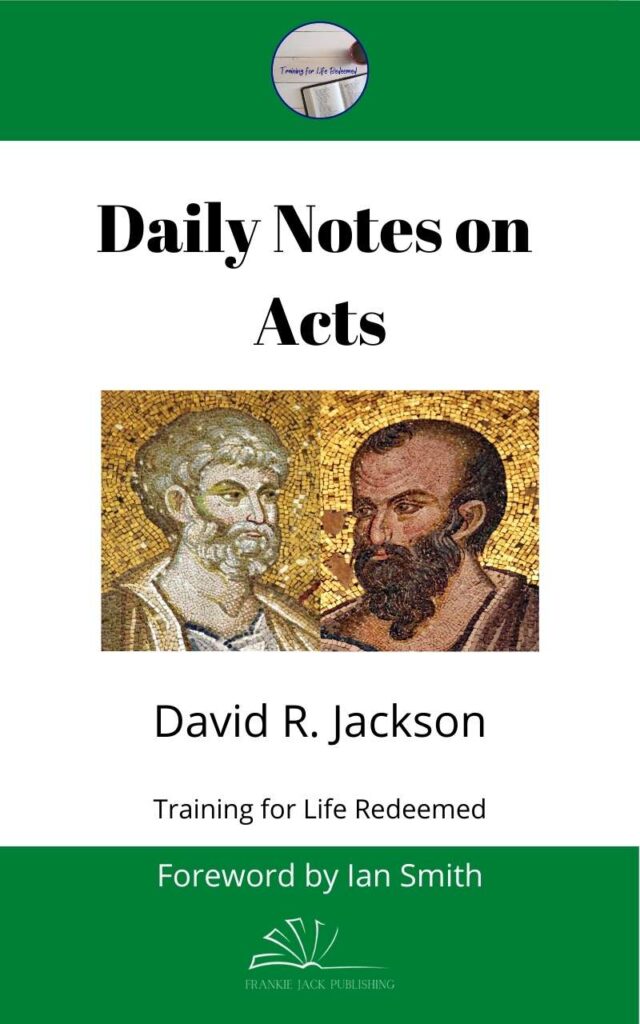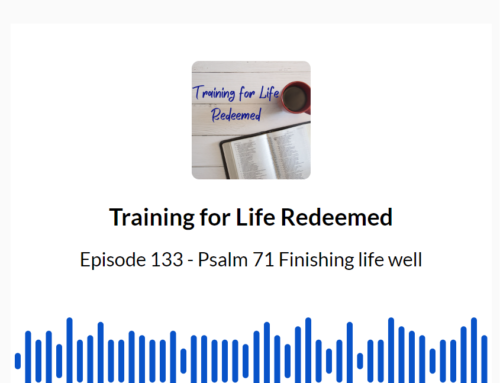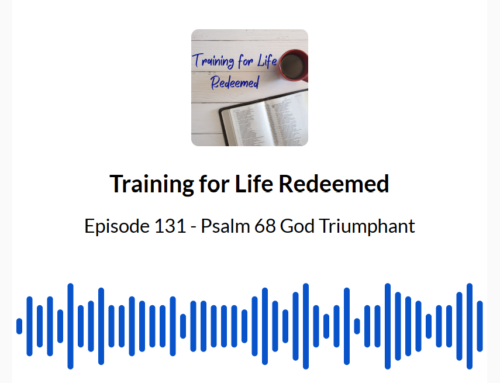The farce of a world trying to run itself without reference to Christ.
In Part 4 God uses his enemies to bring the gospel to the centre of imperial power and influence.
Get the book: Daily notes on Acts
Take the challenge to work through the Book of Acts over thirty-five days. The notes will inform, and set you thinking. They are easy to read in under twenty minutes and include colour photographs, and a section for further reflection or discussion. Ideal for those who want to be prepared to read the Bible with first-time readers. At the end there is a section on words and their meaning, as well as who’s who in Acts.
Grab your notes for this episode by completing the form
and we will send you the link to all our notes.
Transcript
Dan:
Welcome again to trainingforliferedeemed. I'm your host, Dan Jackson. And I'm joined by my father, David Jackson. We are starting part four of our studies in Acts. We've be working through these three at a week, which has been pretty intense, but we're getting through them. This episode is episode 30 and we are looking at Acts chapter 21. We're about halfway through that down to the end of chapter 23. Oh , dad we've come to Paul. At the end of our last episode, Paul was saying farewell to everyone heading back into Jerusalem, knowing that he was going to get arrested and put on trial and all the things that were coming there, there were lots of people were prophesying and, you know, and s aying, Paul, this is how, you know, the Romans are g oing t o lead you away and what's going to happen w hen now even Jerusalem h as arrived and n o surprise, the p rophecies come true.
David:Yeah , they do. It's, it's fun to do the historical background for this particular section, because just before Paul arrives in Caesar Maritima , there were riots in Caesarea Maritima Jews and Greeks w ere writing about whether it was a Roman city or whether it was Jewish. S o what you see, I mean, we see these riots happening with the W estbank Palestinians and Israelis in east Jerusalem. Exactly. The same thing i s happening. And Paul is arriving right in the middle of it. And the Roman governor is dealing with all of this. He sends the troops in and kills a whole bunch of people and steals all of their property. So the Roman governor who doesn't care a hoot about Jews or anybody else, but he's g oing t o make whatever money h e can out of all of this. R ight.
Dan:And also clearly send the message that it's Rome. Yeah .
David:Yep . We are in the world. So this is AD 59 Paul's arriving in Jerusalem. Now he wants to get back to Jerusalem because he's bringing an offering of money from all the churches that he's planted. They've collected all this money. So he's coming with this bodyguard of people from Macedonia and all these areas. And he wants to be there at the significant time of Pentecost. Pentecost is the day when all of the Jews bring their first fruits of their harvest to contribute to the temple. And
Dan:Paul is b ring his first fruits so to speak speak
David:Bringing, is bringing all this tribute from all the other churches that have been planted out of Jerusalem. And they're bringing their tribute as it were back to the church in Jerusalem.
Dan:Is it strange then to the Jerusalem is in a famine or something like that. He's coming to support the poor church in Jerusalem . And so it's kind of funny at Pentecost they have to be celebrating harvest. There isn't the harvest, but Paul is bringing back money to support the church.
David:Yeah. And this is the, it's the first example, I think, in history of foreign aid. So when you think about a lot of the things that in our culture we take for granted, they start here in the Bible , where churches gather together and share their funds to contribute, to support the poor in another country and in Roman empire. That's crazy, but that, you know, here's Theophilus watching this happen, right? And here he is, he's a Torah, observant Jew. He's returning to Jerusalem as he's required to do for the feast. And he's bringing the offering with him. He's walked or they've come down from basically Lebanon, Tyre and Sidon and that area. And they've moved their way down the coast and everywhere they go, Christians come out and go , come and stay at their house. There's lots of hospitality. And the hospitality, I think even extended to the Roman, to other people that were on the journey. And he gets there and he arrives in Caesarea Maaritima. And the people from Jerusalem come out to meet him. And they're providing their little escort to bring him and his money up to Jerusalem. And he's gotta be there for the pet for Pentecost. And he's got to spend a week before Pentecost doing his own ritual cleansing. So he can't actually go up to the temple cause he's been in Gentile lands, he's unclean. So he does the whole Torah observant thing. And people are still accusing Paul of, you know, you're these Christians they're writing off the whole old Testament. We're under grace, not under law. We can throw the Bible in the bin. And they're saying, you know, we're not going to have this fellow cause he's, you know , we've got God's word in writing and who the heck does he think he is? So we're going to go with the scriptures. That's reliable. We know that's God's word. So Paul has got to get some cred here , and they suggest he head up to the temple and pay the fees for a bunch of guys that have done the Nazarite vow. Now we know that Paul also had a Nazarite vow. He cut his hair back in Cenchrea. And I think if I'm reading the Torah, the law, rightly at the time, he had actually had to bring the hair that he cut off and hand it to the priests in the temple to complete his own vows . And there's a whole bunch of people who've come for the feast of Pentecost. They've got other things that they've got to take care of and they suggest to Paul, he could pay their expenses. I went back and I read the Torah on what are the expenses? And for each of those fellows, you bring in a herd of animals to be slaughtered, you know, you've got a bull and you've got a couple of sheep and I, who knows what, that would have cost and he's going to pay for everybody else. So you're going okay? And he gets there and they tell him that the crowd thinks that he's brought a Greek onto the property. Yeah.
Dan:And then instills this beginning of a bit of a riot , I guess it's about to, on the cusp of happening in there. And then the Romans come in and start to settle things down. But Paul speaks to them in Aramaic. No, no. My translation says Aramaic, good one. Yeah. That's right.
David:Yeah. This is where I, I sail my little horse in here. The Greek says Hebrew. Okay. And an interesting thing is happening here. You've had a bunch of false prophets arise in Judea claiming to be the Christ or one starting insurrections against Rome. I mean, this is AD 59, in AD 66 they go to war and a million Jews are slaughtered. The whole thing comes to an end. This is building. This is, you know, you're walking into a time bomb here. And you're at the temple. Back in BC, 165, the Jews revolted again. And they threw out the Greek king who was a nasty piece of work Antiochus the fourth Epiphanes they checked him out and he had been sacrificing pigs to Zeus in the temple and torturing Jews and doing terrible things. So they won that war. And for a period, about a hundred years, they had their independence. Now that's all very exciting. But during that independence movement, they decided that they would revive the language of Hebrew. So it's a funny thing in the dead sea scrolls, the earliest scrolls are written in Aramaic, but starting with the book of Jubilees around 165, it tells a story of how God had to teach Abraham enough Hebrew to , to read the heavenly books. And so now everything at the dead sea scrolls from 165 onwards is written in Hebrew because we're nationalists were asserting that Hebrew is God's language. And Hebrew is what you do as a Torah observant Jew, the Bible was written in Hebrew,
Dan:Supposedly making a point then that he's a Hebrew of Hebrews. I know my Hebrew, he's a rabbi. I'm , about Jerusalem being Israel .
David:Yeah. You're going to put me in the temple and accused me of violating the temple. Hey guys, how many of you can even understand what I'm saying in Hebrew, in Hebrew, not Aramaic, you know , Aramaic was the language of the Persian empire. Greek was the language of the Greek empire. You want to charge me with bringing Greeks in? I'll talk to you in the language of the Torah. And immediately the c rowd goes Woof silent. That's a powerful choice, but I love the fact that in the very next study Acts 22, when the Roman Garrison get him out of there and the crowd g o nuts, the Roman Garrison commander thinks, oh, we'll just scourge This guy, go through Roman p rotocol torture. Remember we find o ut what he did wrong. Nevermind asking the accusers what he did wrong. You find out from him by torture. And Paul turns around and says, I'm a Roman citizen. What's your problem. And the guy, the g uy w as shocked. H e's speaking Greek. A nd I just arrested. This is j ust a Jew. And now he's speaking educated Greek and he's a Roman citizen. And I bought my citizenship and he was born a Roman citizen. This guy ou tranks m e. Uh , l et's take him inside. It's. This is, you can just hear Theophilus, reading this letter, understanding the power of the gospel and the righteousness of the gospel, the innocence of the gospel in a world that just wants to bring down the truth. It has huge impact. Yeah.
Dan:And then it's always you, then that soldier, that whatever he is is Garrison commander in person . Um , he then has the Sanhedrin come the next day to present their case about Paul and Paul using he's well, and truly smart. It's kind of tricky. Funny. I don't know. I , I it's cheeky. I guess
David:You got to remember, this guy was trained in the, by the Sanhedrin. He was an officer of the Sanhedrin. He carried the , he was power head Sanhedrin, power of attorney to arrest Christians in Jewish synagogues in Syria. So, I mean, he was there when Stephen was stoned. He'd probably been there for the 12 years before that with Gamaliel. I fully expect that Paul would have been present during Jesus's trials before Anna and that crowd, he knows it . He knows this stuff. He's one of them. So the Tribune has the authority to summon the Sanhedrin. So you've got this two system of government Jews can take care of Jewish religious law. So if you want to drag somebody out and thrash him 39 times with a stick for, you know , violating the food law or something, that's none of Rome's business. We don't care a hoot about that. But if you want to start a riot and you want to start killing people, well, that's another story. Uh, Rome comes in, the only people are going to be put to death. Yeah , it has to have Roman authority. So you want to riot in the temple grounds, we've got a fortress overlooking the temple, and we're going to come rushing down and sort you fellows out. So, okay. You want to bring charges against this bloke. Let's do it properly. You summon the Sanhedrin. I will bring the accused and we'll come down and I'll see whether this has got any validity to it. So down, we go and Paul is there and they're all being rude and abusive. It's all about the resurrection. Well, I mean, the Sanhedrin is made up of Pharisees and Sadducees. I mean, if you think, you know , labor and liberal party or can be pretty nasty at times, or the Trump versus the Democrats, nothing compared to the Sadducees and the Pharisees, right? So Paul just sticks his little beak in there , like Jesus used to do, you know, the Sadducees don't believe in angels and they're asking about or resurrection. So they asked the question, you know, if a woman ends up marrying seven husbands, one after the other, whose wife is she, and Jesus says , It'll be like the angels at the resurrection. They don't believe in either arm . This is sarcasm. Paul comes in and says, oh, I'm on trial for the resurrection, never mind about, you know, just getting into Jesus and the Messiah stuff you guys will be at United against that the Romans are watching. Let me show you how this works. Uh , and they then tear each other to shreds and you can just see , it's like a Monty Python skit. You know, the Romans are looking at each other while the Jews tear each other apart and just let's get out of here, take this Roman citizen away, be done with it. And they'd take Paul with them. So this prepares good grounds for the credibility of the gospel, that Satan's kingdom is a kingdom divided against itself and it's irrational and it's emotional. It's self-destructive whereas the Christians are coming in doing good healing people, you know , bringing peace, rescuing people and speaking reason in the face of all this emotional rubbish.
Dan:Yeah. Well , our passage with Paul getting transferred off to Caesarea where he was going to stay for a while and we'll come back to him there in our next episode, which we are Wednesday. I'll make sure I remember this. So that's the end of this episode. This is episode 30. So if you would like to grab the study notes for this episode, please head over to trainingforliferedeemed.com/thirty, about to grab the study notes there. And if you enjoyed it, make sure you leave us a review. And of course, make sure that you subscribe. If you haven't so that you can come back and join us on Wednesday for episode 31. When we start to look at Paul on trial before a few of our Roman friends,
David:Not so friendly.




